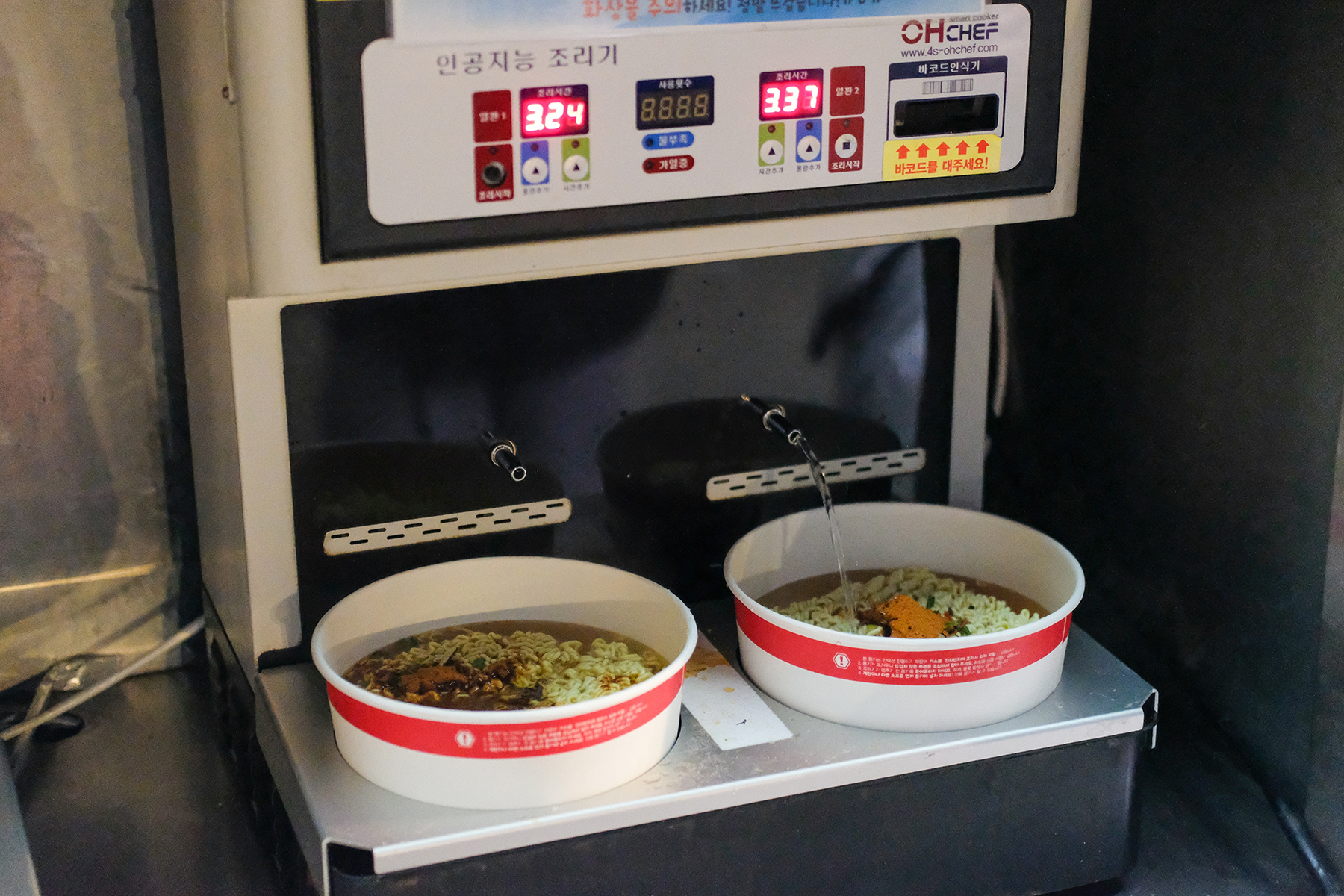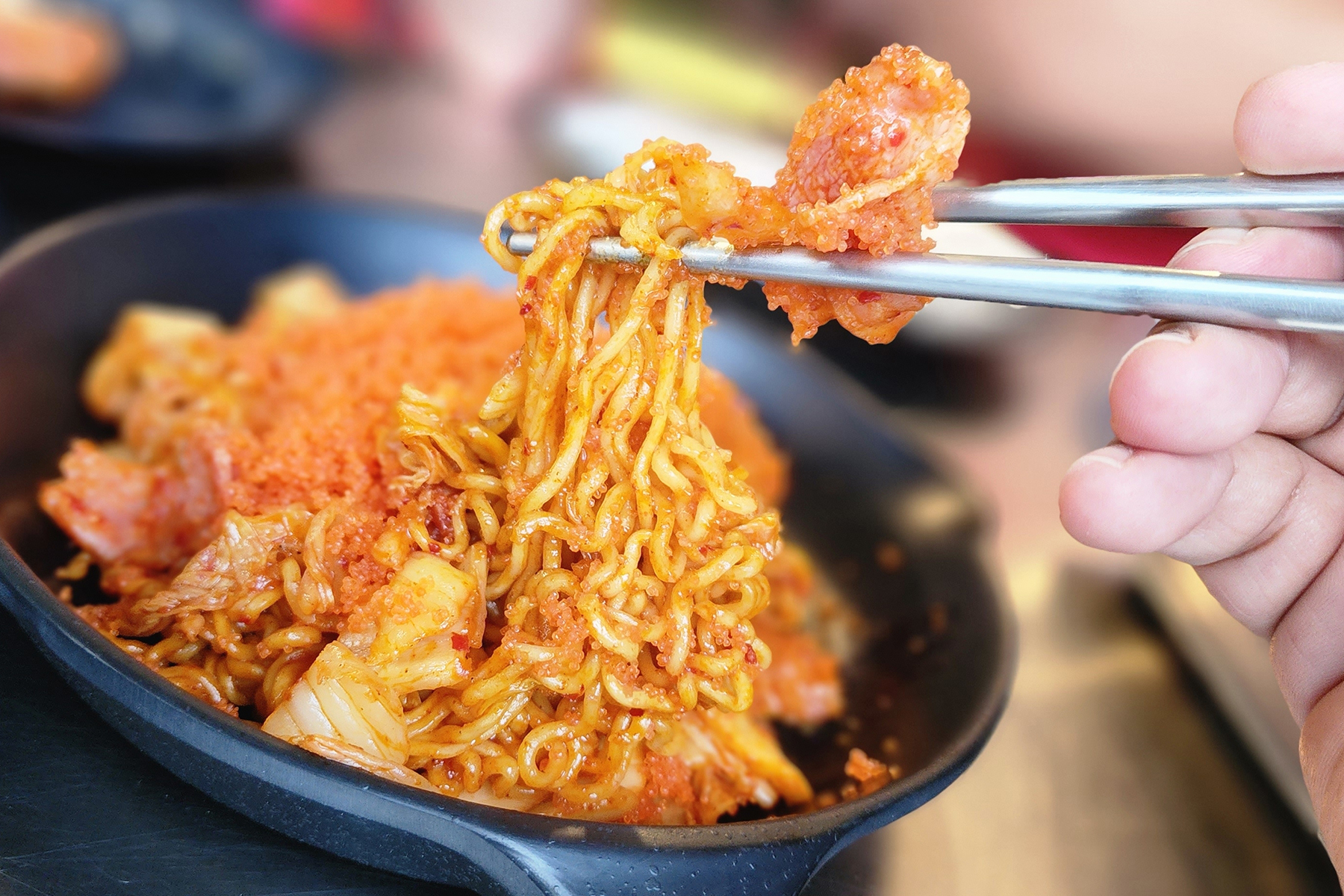
DISCLAIMER: April Fools' Day Parody Special
The purpose of this article is as a work of satirical fiction that was specifically created for, and limited to, embracing the annual tradition of celebrating April Fools’ Day with a parody story. While some subjects are dark, and others lighthearted, none of the content is not intended to be taken seriously, and any attempt to do so is a willful misunderstanding.
Three of South Korea’s largest convenience store chains, GS25, CU, and 7-Eleven Korea, have unveiled a subscription program that aims to transform how consumers enjoy instant noodles.
Called the “Ramen Pass,” the new offering grants subscribers unlimited instant ramen and kimbap for one monthly fee. Though it might have seemed unimaginable a few years ago, industry observers say the strategy reflects Korea’s growing appetite for subscription-based services.
Observers wonder how it might reshape dining habits, both domestically and in places like the United States and Europe.
While “ramen” is the commonly known Japanese term, in Korea instant noodles are called “ramyeon” (라면). The Korean version typically features a bolder, spicier broth compared to its Japanese counterpart. It is a staple in convenience stores and homes alike.
Representatives from GS25, CU, and 7-Eleven Korea say the Ramen Pass offers three plans. The Basic Plan, priced at 9,900 won per month, covers one bowl of ramen per day plus two weekly portions of triangle kimbap.
The 19,900 won Premium Plan allows unlimited ramen and kimbap, along with toppings like cheese, soft-boiled eggs, and tteok (rice cakes).
At 39,900 won, the Ultimate Plan grants all-you-can-boil access to ramen stations, including Japanese imports, and a complimentary set of Samsung’s new Smart Chopsticks. The top-tier membership stands out as the first to bundle cutting-edge hardware with food access.
Early reviews highlight the broad menu potential. According to a spokesperson for GS25, the venture arises from the long-term observation of customer habits. Because many patrons eat ramen daily, the company took a look at how technology could simplify the process.
Industry analysts compared the approach to movie streaming services, arguing that if people pay monthly for entertainment, they might do the same for convenience store meals. While critics question whether unlimited ramen is financially prudent, supporters applaud the plan’s simplicity.
For now, the Ramen Pass is set to roll out nationwide in South Korea, with each store chain hoping to bolster brand loyalty through a steady stream of noodle enthusiasts. One of the hopes is that the convenience will drive interest.
Meanwhile, Samsung Electronics has entered the scene with its Smart Chopsticks, designed to work seamlessly with the Ramen Pass. The company says that the AI-powered utensils can gauge a dish’s temperature, measure calorie content, and detect how well kimchi is fermented.
By pairing embedded sensors with a smartphone app, the chopsticks deliver real-time updates on spice levels and sodium intake. The technology also alerts users when they exceed recommended salt limits, potentially transforming casual dining.
Developers foresee future updates for added health features. Premium and Ultimate Ramen Pass subscribers will receive early access to the innovative chopsticks.
The public response has been passionate, with social media platforms overflowing with discussions about whether a ramen subscription is a dream come true or a health hazard waiting to happen.
Some users have joked about canceling their gym memberships and replacing workouts with unlimited bowls of spicy broth. Others raise concerns about sodium overload and the potential normalization of unhealthy eating habits.
Still, curiosity runs high, and many are saying that they plan to test the process by signing up for a free two-week trial. First-time users can buy a 14-day subscription and get another 14 days free. Several popular YouTube influencers have already scheduled live “ramen marathons” to see how far the pass can go. Some have incorporated it into mukbang-style broadcasts, where they consume large portions on camera while engaging with their audience.
Economists are already referring to the “ramen economy,” a trend poised to alter spending habits. Convenience stores may benefit from monthly income and more foot traffic, while Samsung could see rapid adoption of its smart utensils.
Some experts speculate that beverage firms might soon offer drinks marketed to offset sodium intake, while new apps might help track ramen consumption. If the Ramen Pass thrives, it could spark a wave of other copy-cat meal subscriptions and impact global food industries.
But not everyone is sold on the idea. Health officials remind the public that frequent ramen consumption is linked to high blood pressure and other concerns. They caution that no subscription plan should replace a balanced diet, urging consumers to monitor their intake and avoid the dangers of overindulgence.
Convenience store representatives argue that the variety of toppings and kimbap options can help offset nutritional shortcomings. They also promise to keep healthier ramen varieties in stock. Samsung’s Smart Chopsticks serve as another layer of defense, encouraging mindful eating.
The announcement of the Ramen Pass has already resonated far beyond Korea’s borders. In Milwaukee, local food bloggers have been buzzing about the subscription, featuring it in segments on global dining trends.
Milwaukee, often celebrated for its beer and cheese traditions, has seen a growing interest in Korean culinary culture. Local influencers speculate that if similar passes were available in the United States, they would likely find a receptive audience. Some travelers from Milwaukee even plan to visit Seoul just to sample the Ramen Pass firsthand, blending sightseeing with a culinary adventure.
Meanwhile, travel agencies have started incorporating the pass into package deals, advertising “Ramen Tours” that highlight the convenience store experience alongside cultural landmarks. These itineraries promise visits to flagship GS25 or CU locations and demonstrations of the Smart Chopsticks.
For budget-conscious travelers, unlimited ramen might free up funds for additional sightseeing or souvenir shopping. Analysts see the crossover of industries as a fresh boost for food tourism, where an everyday staple becomes the centerpiece of an international journey. Guided tours include kimchi-tasting sessions.
Rumors suggest that if the Ramen Pass proves popular, convenience store chains will expand their offerings. Proposed concepts include a Tteokbokki Pass for fans of spicy rice cakes, a Bingsoo Membership for summer dessert lovers, and a daily coffee plan targeting caffeine enthusiasts.
Critics worry that the proliferation of subscriptions could lead consumers to overspend on multiple plans, but store executives remain confident about consumer appetite.
Convenience store brands in Korea face fierce competition, prompting them to stand out with unique promotions. By tying a subscription to an everyday item like ramen, the chains aim to capture loyal patrons who might otherwise divide their purchases among several stores. The Ramen Pass might give brands an edge in a saturated market.
Still, questions loom about sustainability. Will consumers maintain their enthusiasm for an unlimited ramen subscription after the novelty fades, or will they tire of repeated flavors?
For now, anticipation runs high as the service begins its wider rollout. Early adopters have shared their strategies online for maximizing the subscriptions, from timing a visit to layering on toppings.
Whether the Ramen Pass redefines how people eat on the go or simply sparks a fleeting fad, it has undoubtedly captured attention in South Korea and abroad. From Seoul’s bustling districts to Milwaukee’s curious food community, all eyes are on Korea’s convenience store chains to see if unlimited noodles and cutting-edge chopsticks can deliver on their promise.
- Misheard around the world: How a humble K-pop song about jazz became an accidental anti-Trump anthem
- Unlimited Ramen: Korean convenience stores roll out instant meal subscriptions with AI-assisted chopsticks
- Ghost Trains of the Koryo Saram: Mystery novel sheds light on Stalin’s forced exile of ethnic Koreans
- Godzilla in Milwaukee: Remembering an ill-fated 1956 movie production that tried to film on Lake Michigan
- Inside the mind of AI: An exclusive interview with ChatGPT about life, Milwaukee, and everything
- Age of Automation: Newsrooms consider ethical implications for journalism by using AI-powered tools
- News organization sparks controversy by replacing all its human journalists in Milwaukee with AI
Alan Smithee
SEOUL, South Korea
Leungchopan, Boontoom Sae-Kor, Icosha, Boontoom Sae-Kor, Ty Lim, Moo Musician, Peena Krub, and Nunung Noor Aisyah (via Shutterstock)
DISCLAIMER: April Fools' Day Parody Special
The purpose of this article is as a work of satirical fiction that was specifically created for, and limited to, embracing the annual tradition of celebrating April Fools’ Day with a parody story. While some subjects are dark, and others lighthearted, none of the content is not intended to be taken seriously, and any attempt to do so is a willful misunderstanding.





















